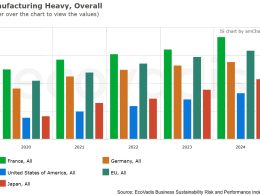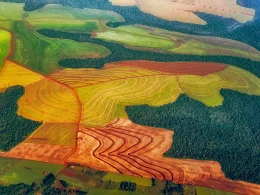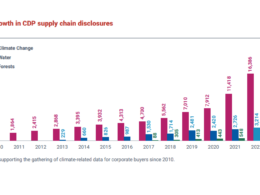The global water cycle is becoming increasingly erratic, with societies swinging between drought and deluge, according to a new report from the World Meteorological Organization (WMO). The State of Global Water Resources 2024 details how climate change is accelerating hydrological extremes, placing mounting pressure on economies, ecosystems and communities worldwide.
The report finds that only one-third of the world’s river basins recorded “normal” conditions in 2024, marking the sixth consecutive year of imbalance. Two-thirds were either wetter or drier than usual, reflecting a destabilised water cycle.
South America’s Amazon, São Francisco and Paraná basins, along with southern Africa’s Zambezi, Limpopo and Okavango, endured severe drought. In contrast, West Africa, Central Europe and parts of Asia experienced widespread flooding, with rivers such as the Danube, Ganges and Indus recording above-average discharge.
Groundwater levels also showed stark contrasts. Of the 37,000 wells assessed across 47 countries, just 38% had normal readings, underscoring the risks of both over-extraction and insufficient recharge.
For the third year running, all glacier regions recorded mass loss, amounting to 450 gigatonnes in 2024 — equivalent to 180 million Olympic swimming pools. This melt alone contributed 1.2 millimetres to global sea level rise.
Particularly severe losses were reported in Scandinavia, Svalbard and North Asia. Colombian glaciers shrank by 5%, highlighting the acute vulnerability of tropical ice masses.
Hydrological extremes had devastating human consequences. Africa’s tropical zone saw record rainfall that killed 2,500 people and displaced four million. Europe experienced its most extensive flooding in over a decade, while Asia and the Pacific were battered by unprecedented cyclones and rainfall. In Brazil, catastrophic southern floods coincided with a deepening drought in the Amazon basin.
“The world’s water resources are under growing pressure and more extreme hazards are taking an increasing toll on lives and livelihoods,” said WMO Secretary-General Celeste Saulo. “Reliable, science-based information is more important than ever because we cannot manage what we do not measure.”
The WMO stressed the urgent need for investment in monitoring networks and international data-sharing to close existing gaps. Without such improvements, it warned, governments risk “flying blind” in the face of intensifying climate impacts.
According to UN Water, 3.6 billion people already face inadequate access to water for at least one month each year — a figure projected to rise to more than five billion by 2050. The findings underline how far the world remains from achieving Sustainable Development Goal 6 on water and sanitation.





















